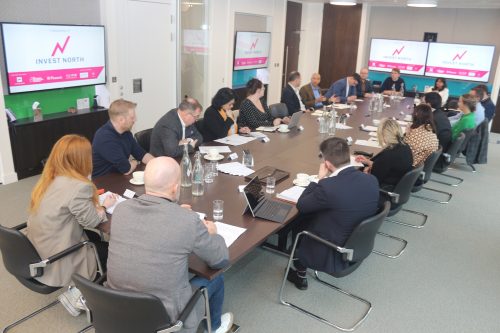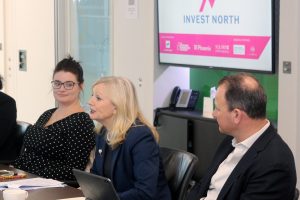Leaders discuss solutions to the talent shortage

The talent shortage – and how to resolve it – was one of the major talking points at the Invest North: West Yorkshire round table.
The issue is a national one, Mark Roberts, chair of the Leeds City Region Local Enterprise Partnership, with unemployment near record lows and high vacancies in certain sectors, especially in rapidly growing tech and digital sectors.
“I certainly know, from trying to recruit developers and product managers and agile workers, it’s hard,” he said, “especially as a small enterprise, and lots of other sectors feel the same.”
Tracy Brabin, Mayor of the West Yorkshire Combined Authority, said she hoped the county would be next in line for the government’s Trailblazer scheme, which would devolve powers over post-129 education.
She said, “As the mayor I want more powers over skills because I want to be agile, to deliver for you the skilled workforce that you need so I can say to an inward investor, come to our region, I will provide you with data wranglers or, you know, location finders or whatever it is that you’re looking for, I can make sure you’ve got that skill pipeline.”
Rik Barker, chief operating officer of XDesign, said successful firms could hinder smaller firms’ growth. “When you become the market, you start hoovering up people from all the businesses around, and a lot of those businesses can’t cope with the change. You have this radiant effect: you’re growing in one areas, but you’re impacting others. There are only a finite number of roles to go around.”
Barker said his firm was trying to source candidates form a wider area, and looking at investing in skills transfer.

WYCA Mayor Tracy Brabin at Invest North: Wesy Yorkshire
Cognizant, which aims to recruit 1,000 people over five years, was conscious of the problem, said senior director Sarah Tulip. “What we’ve been doing is thinking about ways we can give back, so we’ve been doing lots with the council around early careers.”
As well as paying into the Combined Authority’s apprentice levy, intended to go to smaller cap businesses, and one in five of its recruits would be early stage talent. Another 10 to 15% of its workforce would come from India.
“We’re actually growing the workforce in the region,” she said. “We’re not just coming here and taking.”
Sharon Jandhu, founder of the Yorkshire Asian Business Association, said forging overseas links could have further benefits. “What we’ve been doing is using our connections and relationship with country of origin, with government officials, because we have that natural connection, and we’ve been able to bring business over and then take non-Asian businesses to India. And that’s been really, really powerful.”
Peter Kirby, co-founder of sustainable bank Tred, said junior talent was plentiful thanks to the efforts of training and reskilling groups like Northcoders. “Experience is where it gets tricky, because it looks like there’s no influx into the areas. Instead, you’re almost poaching, either directly or through a recruiter. Finding that middle and senior tap is difficult.”
Henri Murison, chief executive of the Northern Powerhouse Partnership, said businesses needed to talk honestly to each other about their recruitment needs and solutions.
“There’s a genuine point that the pools of talent are still relatively small, particularly a junior level, and the public sector isn’t investing enough in creating them,” he said.” But I also don’t think that the traditional approach to how you meet the needs of say the manufacturing sector, is necessarily going to work.”
He added , “You’re going to need another bit of infrastructuire and another bit of ecosystem architecture to properly allow the public sector to fund the things that are actually needed.”
Sir Roger Marsh, advisor with Squire Patton Boggs and former chairman of Leeds City LEP, said the talent shortage was a problem of success.
“There’s a shared endeavour here, between those that are taxpayer funded and the business community to somehow find a solution,” he said. “That means you don’t have this salary arbitrage problem, we actually increase the pool.”
Urvashi Parashar, chief economist with the UK Infrastructure Bank, said there were seven universities across Yorkshire, with thousands of graduates, but many travelled to London to find jobs. She advised creative thinking about how to attract and retain talent.
Mike Briffett, president of Leeds Chamber of Commerce, said he saw opportunity in the fact that one in five residents in the region had no or low skills, and that 190,000 people in Bradford were below the age of 18. “The question for me is how we facilitate the opening up of that talent.”
He looked outside training and upskilling for solutions – more and better housing, better transport infrastructure to allow mobility for education and jobs. “Until we broaden the bottom of the pyramid we’re always going to be faced with that challenge as economic cycles work their way through,” he said.
This is the first of two reports on the Invest North: West Yorkshire discussion. The next report will focus on the discussion of infrastructure and investment.
The North is full of investment opportunities and world-class economic strengths. Accelerating progress and unleashing its full potential can rebalance the national economy and change the lives of the people who live and work here.
Invest North is being led by TheBusinessDesk.com, in partnership with Northern Powerhouse Partnership, Squire Patton Boggs, Phoenix Group, and Lloyds Bank. It is also being supported by the Northern Powerhouse Investment Fund, Curveblock and Influential.
Through a series of round tables, research and interviews it will identify the investment opportunities and policy requirements that can make a significant difference to the economy of the North.
Visit investnorth.thebusinessdesk.com to find out more.









